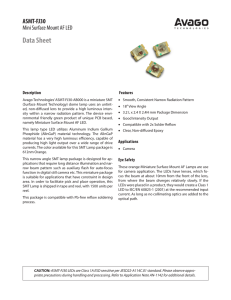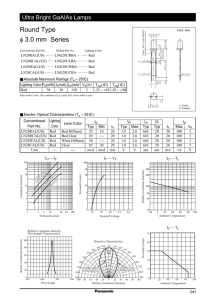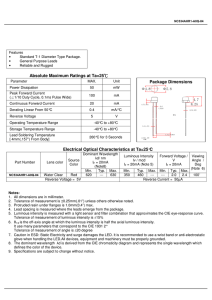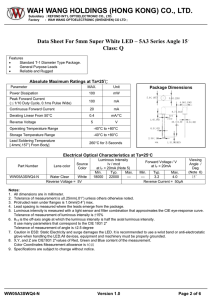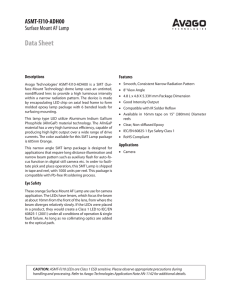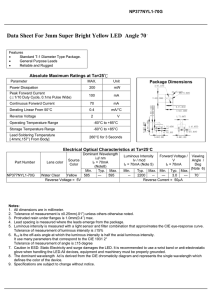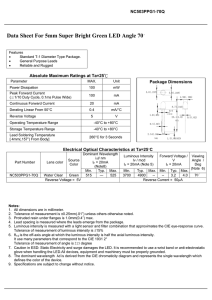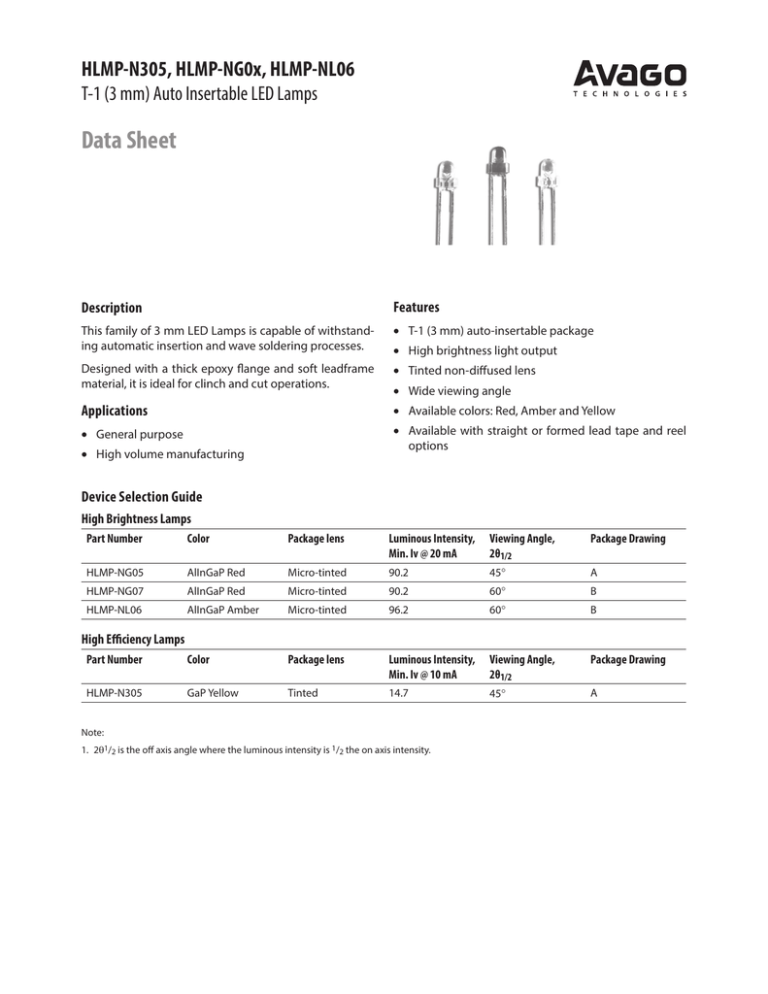
HLMP-N305, HLMP-NG0x, HLMP-NL06
T-1 (3 mm) Auto Insertable LED Lamps
Data Sheet
Description
Features
This family of 3 mm LED Lamps is capable of withstanding automatic insertion and wave soldering processes.
• T-1 (3 mm) auto-insertable package
Designed with a thick epoxy flange and soft leadframe
material, it is ideal for clinch and cut operations.
• Tinted non-diffused lens
Applications
• Available colors: Red, Amber and Yellow
• General purpose
• Available with straight or formed lead tape and reel
options
• High volume manufacturing
• High brightness light output
• Wide viewing angle
Device Selection Guide
High Brightness Lamps
Part Number
Color
Package lens
Luminous Intensity,
Min. Iv @ 20 mA
Viewing Angle,
2θ1/2
Package Drawing
HLMP-NG05
AlInGaP Red
Micro-tinted
90.2
45°
A
HLMP-NG07
AlInGaP Red
Micro-tinted
90.2
60°
B
HLMP-NL06
AlInGaP Amber
Micro-tinted
96.2
60°
B
Part Number
Color
Package lens
Luminous Intensity,
Min. Iv @ 10 mA
Viewing Angle,
2θ1/2
Package Drawing
HLMP-N305
GaP Yellow
Tinted
14.7
45°
A
High Efficiency Lamps
Note:
1. 2θ1/2 is the off axis angle where the luminous intensity is 1/2 the on axis intensity.
Package Dimensions
Package Drawing “A”
SEATING PLANE
23.0
(0.91)
5.9 ± 0.5
(0.23 ± 0.02)
1.0 ± 0.5
(0.04 ± 0.02)
3.5 ± 0.3
(0.14 ± 0.01)
CATHODE MARKS
0.65 (0.03) MAX.
0.4 ± 0.2
(0.02 ± 0.01)
4.4 ± 0.3
3.1 ± 0.2
(0.17 ± 0.01) (0.12 ± 0.01)
2.5 ± 0.3
(0.10 ± 0.01)
0.4 ± 0.2
(0.01 ± 0.01)
+ 0.1
0.4 0
+ 0.00
(0.2 - 0.00 )
0.45 ± 0.10
(0.02 ± 0.007)
2.0 (0.08) REF.
3.4 0.2
(0.13 0.01)
Package Drawing “B”
1.0 MIN.
23.0 MIN.
5.70 ± 0.5
3.50 ± 0.30
CATHODE FLAT
0.65 MAX.
CATHODE LEAD
3.80 ± 0.30 3.10 ± 0.20
0.44 ± 0.2
2.54 ± 0.3
0.8 MAX. EPOXY MENISCUS
+ 0.1
0.4 – 0
2.0
3.60
NOTES:
Notes:
1. ALL DIMENSIONS ARE IN MILLIMETERS (INCHES).
1. All dimensions are
in millimeters
(inches).
2. LEADS
ARE MILD STEEL.
SOLDER COATED.
2. Leads are mild steel
withMENISCUS
tin plating.
3. EPOXY
OF 0.8 mm (0.03 in.) MAXIMUM MAY EXTEND TO THE LEADS.
3. Epoxy meniscus of 0.8 mm (0.03 in.) Maximum may extend to the leads.
4. For PCB hole recommendations, see the Precautions section.
Part Numbering System
HLMP - N x xx
#
xxx
Mechanical Option
002: Tape & Reel, Straight Leads
Viewing Angle Options
05: 45 Degree
06, 07: 60 Degree
Color Options
3: GaP Yellow
G: AlInGaP Red
L: AlInGaP Amber
2
Absolute Maximum Ratings at TA = 25 ºC
AlInGaP
Parameter
Yellow
Amber & Red
Units
DC Forward Current[1]
2030[2,3]mA
Reverse Voltage (Ir = 100 µA)
5
V
Junction Temperature, Tjmax
110
°C
Storage Temperature Range
-40 to +85
°C
Operating Temperature Range
-20 to +85
°C
-40 to +85
Notes:
1. See Figure 4 for maximum current derating vs. ambient temperature.
2. Suggested minimum DC current: 10 mA.
3. Maximum Peak Pulsed Forward Current: 50 mA, 30 mA average.
Electrical Characteristics at TA = 25ºC
Forward Voltage Vf (Volts)
Capacitance
C (pF) , Vf = 0, f = 1 MHz
Thermal
Resistance
RθJ-PIN
Speed of Response
τs (ns)
Time Constant e-t/τs
Part Number
Typ.
(°C/W)
Typ.
HLMP-N305 2.002.6 10 15
290
90
HLMP-NL06[1]2.02 2.4 20
40
240
20
HLMP-NG0x[1]1.90 2.4 20
40
240
20
Typ.
Max.
If (mA)
Note:
1. Please contact your Avago Sales Representative about operating currents below 10 mA.
Optical Characteristics at TA = 25 ºC
Typ. Dominant
Typ. Spectral
Luminous Intensity [1]
Typ. Peak
Wavelength [2]
Half Width
Part Number
Min. (mcd)
If (mA)
Wavelength (nm)
(nm)
(nm)
Luminous
Efficacy [3]
(lm/W)
HLMP-NG0590.2 20
635
626
17
150
HLMP-NG0790.2 20
635
626
17
150
HLMP-NL0696.2 20 592
590
17
480
HLMP-N30514.7 10 583
585
36
500
Notes:
1. The luminous intensity, lv, is measured at the mechanical axis of the lamp package. The actual peak of the spatial radiation pattern may not be
aligned with this axis.
2. The dominant wavelength, ld, is derived from the CIE Chromaticity Diagram and represents the color of the device.
3. The radiant intensity, le, in watts per steradian, may be found from the equation le = lv/hv, where lv is the luminous intensity in candelas and hv
is the luminous efficacy in lumens/watt.
3
HIGH BRIGHTNESS LAMPS
1
AlInGaP AMBER
0.9
AlInGaP RED
RELATIVE INTENSITY
0.8
0.7
0.6
0.5
0.4
0.3
0.2
0.1
0
500
550
600
WAVELENGTH – nm
650
700
HIGH EFFICIENCY LAMPS
RELATIVE INTENSITY
1.0
0.5
YELLOW
0
500
550
600
650
700
WAVELENGTH – nm
Figure 1. Relative intensity vs. peak wavelength.
HIGH BRIGHTNESS LAMPS
50
HIGH EFFICIENCY LAMPS
90
IF – FORWARD CURRENT – mA
IF – FORWARD CURRENT – mA
80
40
30
AlInGaP RED
20
AlInGaP AMBER
10
70
60
50
YELLOW
40
30
20
10
0
0
0.5
1.0
1.5
2.0
VF – FORWARD VOLTAGE – V
Figure 2. Forward current vs. forward voltage.
4
2.5
0
0
0.5
1.0 1.5 2.0 2.5 3.0
VF – FORWARD VOLTAGE – V
3.5
4.0
HIGH BRIGHTNESS LAMPS
2.0
YELLOW
4.0
1.5
RELATIVE LUMINOUS INTENSITY
(NORMALIZED AT 10 mA)
RELATIVE LUMINOUS INTENSITY
(NORMALIZED AT 20 mA)
3.5
AlInGaP
1.0
0.5
3.0
2.5
2.0
1.5
1.0
0.5
0
0
10
20
40
30
IF – DC FORWARD CURRENT – mA
AlInGaP
IF – FORWARD CURRENT – mA
35
30
25
RqJA = 500° C/W
20
RqJA = 650° C/W
RqJA = 750° C/W
15
10
5
0
0
10
20
30
40
50
60
70
80
90
TA – AMBIENT TEMPERATURE – °C
Figure 4. Maximum forward DC current vs. ambient temperature.
5
0
5
10
15
20
IDC – DC CURRENT PER LED – mA
Figure 3. Relative luminous intensity vs. forward current.
40
0
25
30
1
0.9
NORMALIZED INTENSITY
0.8
0.7
0.6
0.5
0.4
0.3
0.2
0.1
0
-90 -80 -70 -60 -50 -40 -30 -20 -10
0
10
20
30
40
50
60
70
80
90
40
50
60
70
80
90
ANGULAR DISPLACEMENT – DEGREES
Figure 5. Representative spatial radiation pattern for 45° viewing angle.
1
0.9
NORMALIZED INTENSITY
0.8
0.7
0.6
0.5
0.4
0.3
0.2
0.1
0
-90 -80 -70 -60 -50 -40 -30 -20 -10
0
10
20
30
ANGULAR DISPLACEMENT – DEGREES
Figure 6. Representative spatial radiation pattern for 60° viewing angle.
6
Intensity Bin Limits
Amber Color Bin Limits
Color
Bin
Intensity Range (mcd)
Min.
Max.
H13.8 27.6
(nm at 20 mA)
Bin Name
Min. 1
584.5587.0
I22.0 44.0
2
587.0589.5
J35.2 70.4
4
589.5592.0
K56.4 112.8
6
592.0594.5
L90.2 180.4
M138.0 276.0
N200.0 400.0
O290.0 580.0
Red/OrangeP
500.0
1000.0
/Red-OrangeQ
700.0
1400.0
R 1000.02000.0
S 1400.02800.0
T 2000.04000.0
U 2900.05800.0
V 4200.08400.0
W 6000.012000.0
X 8700.017400.0
Y 12600.025200.0
Z 18200.036400.0
G14.7 29.4
H23.5 47.0
I37.6 75.2
J60.1 120.2
K96.2 192.4
L147.0294.0
M212.0 424.0
Yellow/AmberN
300.0
600.0
O450.0 900.0
P700.01400.0
Q
R 1600.03200.0
S 2600.05200.0
T 4000.08000.0
U 6500.013000.0
V 10000.020000.0
W 16000.030000.0
1000.0
Maximum tolerance for each bin limit is ±18%.
7
2000.0
Tolerance for each bin limit is ±0.5 nm.
Max.
Color Categories
Color
Category #
Lambda (nm)
Min. Max.
1
582.0584.5
3
584.5587.0
Yellow2
587.0 589.5
4
589.5592.0
5
592.0593.0
Tolerance for each bin limit is ±0.5 nm.
Taping Options
Straight Lead
Option
#002#2CA#2CD
Dimension “B”
–
–
–
Dimension “H”
20.5 ± 1.0
(0.81 ± 0.04)
18.0 ± 1.0
(0.71 ± 0.04)
20.5 ± 1.0
(0.81 ± 0.04)
Formed Lead
Option
#2UK#2UL #2UM #2UN#2UP#2UQ#2UR
Dimension “B”
12.0 ± 1.0
(0.47 ± 0.04)
9.0 ± 1.0
(0.35 ± 0.04)
10.0 ± 1.0
(0.39 ± 0.04)
Dimension “H”
Units: mm (inches)
8
11.0 ± 1.0
(0.43 ± 0.04)
16.0 ± 1.0
(0.63 ± 0.04)
13.0 ± 1.0
(0.51 ± 0.04)
14.0 ± 1.0
(0.55 ± 0.04)
15.0 ± 1.0
(0.59 ± 0.04)
Tape Outline Drawing
6.4 ± 1.3
(0.25 ± 0.05)
0.0 ± 1.0
(0.00 ± 0.04)
12.7 ± 1.0
(0.50 ± 0.04)
CATHODE
LEAD
5.1 ± 0.7
(0.20 ± 0.03)
DIMENSION "H"
(SEE TABLE)
2.5 (0.10) MAX.
18.0 ± 1.0
(0.71 ± 0.04)
14.0 ± 1.7
(0.55 ± 0.07)
11.0 MAX.
(0.43)
9.1 ± 0.6
(0.36 ± 0.03)
2.5 ± 0.3
(0.10 ± 0.01)
12.7 ± 0.3
(0.50 ± 0.01)
A
A
∅
4.0 ± 0.2 TYP.
(0.16 ± 0.01)
VIEW A–A
0.7 ± 0.2
(0.03 ± 0.01)
Straight Lead
6.4 ± 1.3
(0.25 ± 0.05)
0.0 ± 1.0
(0.00 ± 0.04)
12.7 ± 1.0
(0.50 ± 0.04)
CATHODE
LEAD
DIMENSION "B"
(SEE TABLE)
3.9 ± 0.7
(0.15 ± 0.03)
DIMENSION "H"
(SEE TABLE)
2.5 (0.10) MAX.
18.0 ± 1.0
(0.71 ± 0.04)
14.0 ± 1.7
(0.55 ± 0.07)
11.0 MAX.
(0.43)
9.1 ± 0.6
(0.36 ± 0.03)
2.5 ± 0.3
(0.10 ± 0.01)
12.7 ± 0.3
(0.50 ± 0.01)
0.7 ± 0.2
(0.03 ± 0.01)
Formed Lead
Note: Dimension in mm (inches).
9
A
A
VIEW A–A
∅
4.0 ± 0.2 TYP.
(0.16 ± 0.01)
Recommended Assembly Condition
Package Options
Lead Option
Ammo Pack (1000 pcs.)
Tape & Reel
(2000 pcs.)
Straight Lead
#2C —
#002
Formed Lead
#2U —
–
AMMO PACK (for All options except #002)
• A single-sided phenolic printed circuit board (PCB) is
preferred. Double-sided PCB and other materials may
cause greater lead stress. Recommended throughhole diameter is 0.98 to 1.08 mm. Leadlength below
the PCB should be 1.5 to 2.0 mm, and the clinching
angle (angle between the lead and PCB) should be 30
±10 degrees.
• If SMT devices and an adhesive are used on the same
pcb as these lamps, the adhesive should be cured
before the lamps are auto-inserted. If curing must
be done after lamp insertion, the cure
temperature and time should not exceed 140°C,
100 seconds. This is the temperature of the surface
normal to the IR source.
TAPE & REEL (for option #002 only)
REELING ORIENTATION
CLOCKWISE
ADHESIVE TAPE MUST BE
FACING TOWARDS THE
OUTSIDE OF THE REEL.
ANODE LEAD LEAVES
THE REEL FIRST.
110 (4.33) DIA.
336 (13.23) DIA.
DIMENSIONS IN MILLIMETERS (INCHES).
PROTECTIVE
CARDBOARD
Precautions
Lead Forming
• The leads of an LED lamp may be preformed or cut to
length prior to insertion and soldering into PC board.
• If lead forming is required before soldering, care must
be taken to avoid any excessive mechanical stress
induced to LED package. Otherwise, cut the leads
of LED to length after soldering process at room
temperature. The solder joint formed will absorb the
mechanical stress of the lead cutting from traveling to
the LED chip die attach and wirebond.
• It is recommended that tooling made to precisely
form and cut the leads to length rather than rely upon
hand operation.
Soldering Conditions
• Care must be taken during PCB assembly and soldering
process to prevent damage to LED component.
• The closest LED is allowed to solder on board is 1.59
mm below the body (encapsulant epoxy) for those
parts without standoff.
• Wave soldering parameter must be set and maintained
according to recommended temperature and dwell
time in the solder wave. Customer is advised to
periodically check on the soldering profile to ensure
the soldering profile used is always conforming to
recommended soldering condition.
• If necessary, use fixture to hold the LED component
in proper orientation with respect to the PCB during
soldering process.
• Proper handling is imperative to avoid excessive
thermal stresses to LED components when heated.
Therefore, the soldered PCB must be allowed to cool
to room temperature, 25°C, before handling.
• Special attention must be given to board fabrication,
solder masking, surface plating and lead holes size
and component orientation to assure solderability.
• Recommended PC board plated through hole sizes
for LED component leads:
• Recommended soldering conditions:
Diagonal
Plated Through
-Hole Diameter
Lead size (typ.)
0.45 × 0.45 mm
(0.018 × 0.018 in.)
0.636 mm
(0.025 in)
0.98 to 1.08 mm
(0.039 to 0.043 in)
Wave Soldering
Dipping
Manual Solder
Pre-heat Temperature
105 °C Max.
–
Pre-heat Time
30 sec Max.
–
Peak Temperature
250 °C Max.
260 °C Max.
Dambar shearoff area (max.)
0.65 mm
(0.026 in)
0.919 mm
(0.036 in)
Dwell Time
3 sec Max.
5 sec Max.
Lead size (typ.)
0.50 × 0.50 mm
(0.020 × 0.020 in.)
0.707 mm
(0.028 in)
Dambar shearoff area (max.)
0.70 mm
(0.028 in)
0.99 mm
(0.039 in)
TURBULENT WAVE
250
TEMPERATURE – °C
LED Component
Lead Size
LAMINAR WAVE
HOT AIR KNIFE
CONVEYOR SPEED = 1.83 M/MIN (6 FT/MIN)
PREHEAT SETTING = 150°C (100°C PCB)
SOLDER WAVE TEMPERATURE = 245°C
AIR KNIFE AIR TEMPERATURE = 390°C
AIR KNIFE DISTANCE = 1.91 mm (0.25 IN.)
AIR KNIFE ANGLE = 40
SOLDER: SN63; FLUX: RMA
150
FLUXING
100
50
30
PREHEAT
0
10
20
30
Note: Refer to application note AN1027 for more information on
soldering LED components.
BOTTOM SIDE
OF PC BOARD
TOP SIDE OF
PC BOARD
200
40
50
60
TIME – SECONDS
70
80
90
100
NOTE: ALLOW FOR BOARDS TO BE
SUFFICIENTLY COOLED BEFORE EXERTING
MECHANICAL FORCE.
Figure 7. Recommended wave soldering profile.
For product information and a complete list of distributors, please go to our website:
1.05 to 1.15 mm
(0.041 to 0.045 in)
www.avagotech.com
Avago, Avago Technologies, and the A logo are trademarks of Avago Technologies in the United States and other countries.
Data subject to change. Copyright © 2005-2014 Avago Technologies. All rights reserved. Obsoletes 5989-4257EN
AV02-1014EN - July 14, 2014

